|
|
|
Sort Order |
|
|
|
Items / Page
|
|
|
|
|
|
|
| Srl | Item |
| 1 |
ID:
153602
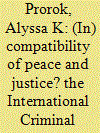

|
|
|
|
|
| Summary/Abstract |
Does the International Criminal Court's (ICC) pursuit of justice facilitate peace or prolong conflict? This paper addresses the “peace versus justice” debate by examining the ICC's impact on civil conflict termination. Active ICC involvement in a conflict increases the threat of punishment for rebel and state leaders, which, under certain conditions, generates incentives for these leaders to continue the conflict as a way to avoid capture, transfer to the Hague, and prosecution. The impact of ICC involvement is conditional upon the threat of domestic punishment that leaders face; as the risk of domestic punishment increases, the conflict-prolonging effects of ICC involvement diminish. I test these theoretical expectations on a data set of all civil conflict dyads from 2002 to 2013. Findings support the hypothesized relationship. Even after addressing potential selection and endogeneity concerns, I find that active involvement by the ICC significantly decreases the likelihood of conflict termination when the threat of domestic punishment is relatively low.
|
|
|
|
|
|
|
|
|
|
|
|
|
|
|
|
| 2 |
ID:
087826
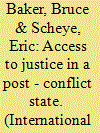

|
|
|
|
|
| Publication |
2009.
|
| Summary/Abstract |
Post-conflict governments and donors prioritize rebuilding the justice sector through state delivered rule of law and access to justice programmes. Misunderstanding the nature of the post-colonial state, such programmes make questionable assumptions. First, that a lack of access to state justice is the same as an overall absence of justice. Second, that the state system that is being built is what people want. Third, that the state system of justice that is being built could provide a sustainable nationwide network in the foreseeable future. Based on interviews conducted with policy designers, practitioners, local people and chiefs at three sites in southern Sudan 2007, this article calls for a rethinking of donor-supported justice and police development and advocates an approach that recognizes the importance of local justice.
|
|
|
|
|
|
|
|
|
|
|
|
|
|
|
|
| 3 |
ID:
108462
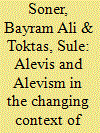

|
|
|
|
|
| Publication |
2011.
|
| Summary/Abstract |
The Justice and Development Party (JDP, Adalet ve Kalk?nma Partisi) has launched a rapprochement policy toward the Alevis. The JDP's Alevi Opening has presented a unique case in Turkey's latest identity politics not only because Alevi claims, for the first time, came to be involved in political processes for official recognition and accommodation, but also because the process was handled by a political party which is regarded to have retained Islamist roots in Sunni interpretation. This article explores the JDP's Alevi Opening process and tries to explain the motivations behind the party's decision to incorporate the Alevi question in its political agenda. What is more, the debate that the opening has caused is also under scrutiny with the positions and arguments held by the actors and the agencies involved in the process, e.g., the Alevis (the secularist and the conservative wings), the General Directorate of Religious Affairs, the National Security Council, the JDP leadership and the Islamist intellectuals.
|
|
|
|
|
|
|
|
|
|
|
|
|
|
|
|
| 4 |
ID:
113277
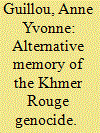

|
|
|
|
|
| Publication |
2012.
|
| Summary/Abstract |
This article contrasts the ways in which the memories of the Khmer Rouge genocide have been constructed at different levels and at different periods since the 1980s. Various actors have been involved in this construction, such as the ruling Cambodian People's Party, the Khmer Rouge Court sponsored by the United Nations since 2007, and Cambodian villagers. This has led to numerous misunderstandings and discrepancies regarding the trial of the former Khmer Rouge leaders. The current research is based on ethnographic fieldwork undertaken in a village in the province of Pursat. It shows how the villagers have taken care of the human remains from the state-sponsored memorials and of the mass graves (that is to say, of the unknown bodies). The article shows how the Khmer popular religious system is instrumental in forging a memory of the dead of the Pol Pot regime and in healing social suffering.
|
|
|
|
|
|
|
|
|
|
|
|
|
|
|
|
| 5 |
ID:
110128
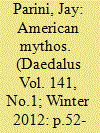

|
|
|
|
|
| Publication |
2012.
|
| Summary/Abstract |
This essay examines the notion of an American narrative, looking at a variety of myths that have been prominent and that have, in various ways, shaped the concept of a nation devoted to Enlightenment and Anglo-Saxon ideals. These include liberty, equality, and justice, which can be traced to thinkers such as Montesquieu, as well as ideals laid out in the Magna Carta. These lofty ideals took the place of more traditional narratives and tribal alliances, and they helped establish a nation that had been formed by so many different immigrant strands. That these stories - going back to the Puritans landing on Plymouth Rock, for example - have been influential seems beyond question. Yet it remains difficult to assess their broader value in determining the course of a nation. How might these founding myths prove useful in refashioning the American stories in ways that, in the future, could be productive?
|
|
|
|
|
|
|
|
|
|
|
|
|
|
|
|
| 6 |
ID:
095301
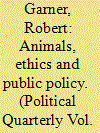

|
|
|
|
|
| Publication |
2010.
|
| Summary/Abstract |
In orthodox moral thinking in the West, animals count for something but human interests take precedence. It is argued that this moral orthodoxy or animal welfare position is flawed. It fails to take into account that some animals, like humans, are persons and that some, so-called 'marginal' humans lack personhood. More importantly, although it is likely that animals do not have an interest in liberty for its own sake and have less of an interest in continued life than humans, there is little justification for the animal welfare claim that an animal's suffering should be regarded as less important morally than that of a human. It is concluded that the adoption of a 'sentiency position', whereby animals have a right not to suffer, has radical implications for the way animals are treated, ruling out intensive forms of animal agriculture and those scientific procedures that inflict suffering as morally illegitimate.
|
|
|
|
|
|
|
|
|
|
|
|
|
|
|
|
| 7 |
ID:
101138
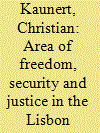

|
|
|
|
|
| Publication |
2010.
|
| Summary/Abstract |
Scholars may rightly claim the European Union's (EU) area of freedom, security and justice (AFSJ) has become one of the most significant developments in the European integration process. The Lisbon Treaty (LT) has the potential to push the AFSJ towards tremendous growth, and has provided the policy area with instruments that were unthinkable after the third pillar was created during the Maastricht Treaty negotiations. This article investigates the role of the European Commission in the process of constructing an 'AFSJ'. It argues that the Commission (through alliances with other institutional actors) managed to incrementally contribute to this shift in political norms. This shift derived from the policy-making level from 1999 onwards. It manifested itself specifically during the negotiations of the Constitutional Treaty (CT) and the subsequent re-negotiation of the LT. Here, the Commission acted with the support and the use of other supranational actors during the Convention, without which this result would have been difficult, if not impossible, to obtain. Firstly, the article will deal with the main advances of the CT which resulted in the LT. Subsequently, the role of the Commission and other EU institutional actors will be examined, resulting in an overall evaluation.
|
|
|
|
|
|
|
|
|
|
|
|
|
|
|
|
| 8 |
ID:
102038
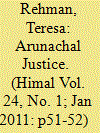

|
|
|
| 9 |
ID:
114762
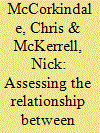

|
|
|
|
|
| Publication |
2012.
|
| Summary/Abstract |
In this article, the authors will consider a very narrow yet spectacularly important aspect of the rule of law: its place in a constitution-the constitution of the United Kingdom-in which supremacy rests not with the constitution as a document to be interpreted by a constitutional court, but with the legislature itself. While traditionally the supremacy of the Crown in Parliament has meant that British courts have had no right to set aside even the most oppressive legislation, recent extra-judicial writings and obiter dicta in case law have been indicative of a shift in the judicial mood. In light of these developments, the paper will ask: Where does the relationship between the supremacy of the Crown in Parliament and the rule of law stand now? Where might that trajectory take us? And what might be done to reconcile the two?
|
|
|
|
|
|
|
|
|
|
|
|
|
|
|
|
| 10 |
ID:
073641
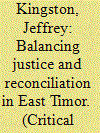

|
|
|
|
|
| Publication |
2006.
|
| Summary/Abstract |
As East Timor emerges from a long Indonesian nightmare, it is seeking to balance the agendas of justice and reconciliation. The verdict on justice for East Timor is one of disappointment. The main obstacle to accountability is Indonesia, abetted by an international community that seeks its assistance in the "war on terror." East Timor's leaders have emphasized reconciliation while promoting a healing process and good governance. Recent violence reveals just how difficult this task remains. The hybrid tribunal established in East Timor by the UN was once heralded as an important innovation in transitional justice, avoiding the high cost and lengthy proceedings of other international tribunals. However, the tribunal has been unable to hold accountable those who bear the greatest responsibility for outrages committed against Timorese and defendants did not get fair trials or competent defense. A truth commission report released in December 2005, Chega! (Enough), emphasizes justice and reparations. The political leadership soft peddles justice because they believe this makes more sense and will better serve the people. Indonesians are now being given a chance to testify in front of the Commission of Truth and Friendship (CTF), but concern is widespread concern that the CTF emphasizes reaching closure, has no judicial mandate, and only ensures impunity for ranking perpetrators. Indonesia and East Timorese can regain dignity and move beyond their shared tragedy through a process of reconciliation that is based on justice and atonement. Germany shows this is possible; Japan, that it is difficult and problematic if neglected.
|
|
|
|
|
|
|
|
|
|
|
|
|
|
|
|
| 11 |
ID:
156245
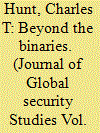

|
|
|
|
|
| Summary/Abstract |
The multiplicity of sources of security and justice in post-colonial states are often categorized according to a series of fixed analytical binaries. Such reductive dichotomies often mask the fluid and evolutionary ecology of these highly networked actors. As a result, the ways in which they co-produce social order are seldom well-understood and the ramifications for peacebuilding remain underexplored. This article examines the relationships between myriad providers of security and justice. Using examples from fieldwork in West Africa, it presents a case for a relational approach to peacebuilding that introduces the concept of symbiosis to develop a framework for evaluating these relations. It argues that the framework and conceptual steps involved create important opportunities for both new research and emerging practices of peacebuilding.
|
|
|
|
|
|
|
|
|
|
|
|
|
|
|
|
| 12 |
ID:
130027
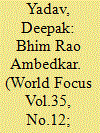

|
|
|
|
|
| Publication |
2014.
|
| Summary/Abstract |
Dr Ambedkar's legacy as a socio-political reformer had a deep effect on modern India. He believed that "political democracy without social democracy and economic justice is meaningless." In post-Independence India his socio-political thought has acquired respect across the political spectrum. His initiatives have influenced various spheres of life and transformed the way India today looks at socio-economic policies, education and affirmative action through socio-economic and legal incentives. His reputation as a scholar led to his appointment as free India's first law minister, and chairman of the committee responsible to draft a constitution. He passionately believed in the freedom of the individual and criticized equally both orthodox casteist Hindu society.
|
|
|
|
|
|
|
|
|
|
|
|
|
|
|
|
| 13 |
ID:
095530
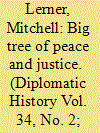

|
|
|
|
|
| Publication |
2010.
|
| Summary/Abstract |
During his three years as John F. Kennedy's vice president, Lyndon Johnson made eleven trips to thirty-three countries, covering over 120,000 miles, more than any of his predecessors. Yet, few contemporaries, including the journalist who described Johnson as someone "who chases around continents in search of the duties of his office," considered these trips significant.1 Some even suspected that he was sent away so often simply because JFK wanted to keep the overbearing Texan occupied and hence away from him; Kennedy, one West Virginia newspaper wrote, had recently sent him overseas twice in order "to keep his Vice President busy."2 Most policymakers also saw these missions as unimportant. Deputy Undersecretary of State William Crockett, who sometimes accompanied Johnson, recalled that "on the trips he took as Vice-President, there wasn't much policy to discuss; they were essentially representational functions."3 Such sentiments were both common and unsurprising, as Americans everywhere recognized that Johnson played virtually no role in the major policy decisions of the administration. In 1963, Time Magazine noted that the former Senate leader was now "lost in the vice-presidency," and a Newsweek article entitled "LBJ: Who's That?" described its subject as "as powerless as a freshman Senator and almost as obscure."4 A year earlier, Newsweek had noted of the former leader that "Lyndon Johnson is in the position of an abdicated king, and kings who abdicate are monarchs without power."5 His nonexistence seemed confirmed by the television show Candid Camera, which asked random people, "Who is Lyndon Johnson?" Answers flew: a baseball player, an astronaut, but no one (at least, no one who was televised) identified him as the vice president of theUnited States. "No, I don't know him," explained one man. "I'm from New Jersey.
|
|
|
|
|
|
|
|
|
|
|
|
|
|
|
|
| 14 |
ID:
117617
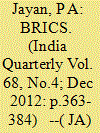

|
|
|
|
|
| Publication |
2012.
|
| Summary/Abstract |
In the era of regional international relations and more interdependence, organisations like the Brazil, Russia, India, China and South Africa (BRICS) can play a meaningful role in international level as well as regional in years to come. The recent summit of the BRICS reiterates that more cooperation is needed at various levels. In Delhi declaration, it is called for a more representative international financial architecture, with an increase in the voice and representation of developing countries and the establishment and improvement of a just international monetary system that can serve the interests of all countries and support the development of emerging and developing economies. Moreover, these economies having experienced broad-based growth are now significant contributors to global recovery. This is true. One must acknowledge the fact that the roles of the BRICS countries are composed of various political systems, various subcontinent, but in the changed context, all these countries are coming under the purview of the 'developing countries' in broader terms. That makes the BRICS beyond the regional boundaries to set a benchmark in the regional cooperation. China's permanent status in the United Nations makes the BRICS more strategically oriented and pragmatic aspects of foreign policy engagement in the twenty-first century. The political leadership and vision is equally important with economic engagement. The four major theories of the international relations (IR) are striking in this respect which includes liberalism, realism, constructivism and Marxism. Theoretical framework relevant to regionalism in focusing on IR theories is also analysed in this article. The main argument of the article is that there is no prescribed regional model and BRICS has to tune to the member countries' regional and political frameworks to engage with. Therefore, the framework of analysis is more or less critical about the Western engagement and it is region focused.
|
|
|
|
|
|
|
|
|
|
|
|
|
|
|
|
| 15 |
ID:
108132
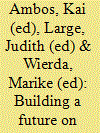

|
|
|
|
|
| Publication |
Berlin, Springer, 2009.
|
| Description |
xx, 572 p.
|
| Standard Number |
9783540857532, hbk
|
|
|
|
|
|
|
|
|
|
|
|
Copies: C:1/I:0,R:0,Q:0
Circulation
| Accession# | Call# | Current Location | Status | Policy | Location |
| 056329 | 340.11/AMB 056329 | Main | On Shelf | General | |
|
|
|
|
| 16 |
ID:
078432
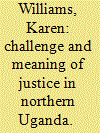

|
|
|
| 17 |
ID:
145995
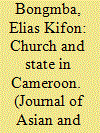

|
|
|
|
|
| Summary/Abstract |
In this essay, I discuss church state relations in Cameroon through a hermeneutics of the political theology of Christian Cardinal Tumi. I begin with a brief introduction to set the scene and follow it with a discussion of two major works by Cardinal Tumi. In the first book Tumi provides a detailed analysis of his relationship with the political leaders of Cameroon, and in the second book, he articulates his political theology. I conclude by arguing that one way forward for a political theology in Cameroon is to embrace a broad perspective that is not restricted to one’s personal faith in Jesus Christ.
|
|
|
|
|
|
|
|
|
|
|
|
|
|
|
|
| 18 |
ID:
138258
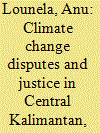

|
|
|
|
|
| Summary/Abstract |
In 2010, the province of Central Kalimantan in Indonesia was established as a Climate Change pilot province to reduce emissions from deforestation and through peat land forest rehabilitation. Today, international agencies, carbon traders, local and national governments, non-governmental organisations, and local populations have participated in debates and disputes over the establishment of carbon forests and forest protection areas in Central Kalimantan. One such scheme, promoted by the government of Australia (Kalimantan Forest and Climate Partnership), intended to establish a REDD+ pilot project within an area that covers about 120 000 hectares in Kuala Kapuas in Central Kalimantan, the field location of this research. This specific dispute offers a case study based on ethnographic research that helps to illustrate how widespread climate change debates and disputes become embedded at local and national levels in Indonesia. The dispute over REDD+ will be discussed within a framework of dispute theories which focus on moments of crisis, wherein participants must present arguments and justify their actions and theories of justice. The article shows that competing and conflicting conceptions of justice that emerge in the dispute may bring to a halt a climate change pilot project in the locality.
|
|
|
|
|
|
|
|
|
|
|
|
|
|
|
|
| 19 |
ID:
141810
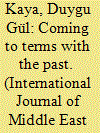

|
|
|
|
|
| Summary/Abstract |
This article examines the growing interest in questions of memory, trauma, and justice in Turkey, with a special focus on the notion of “coming to terms with the past.” Through an analysis of key academic and popular texts published between 2002 and 2013, it argues that “coming to terms with the past” is a therapeutic public discourse that rewrites national history through the temporality of trauma. In other words, this discourse reconfigures the sequence of past, present, and future as the beginning, development, and end of a case of collective trauma, applying the psychotherapeutic terminology of victimhood, healing, and forgiveness to social realities. The article offers new perspective on existing debates over “coming to terms with the past” by analyzing the limits of this therapeutic discourse and by exploring the potential and open-endedness of the politics of memory in Turkey.
|
|
|
|
|
|
|
|
|
|
|
|
|
|
|
|
| 20 |
ID:
105175
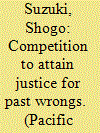

|
|
|
|
|
| Publication |
2011.
|
| Summary/Abstract |
This article joins the debate on transnational campaigns for Japanese historical wrongs in the Asia-Pacific by highlighting the collective "forgetting" on the part of the victims' society. Focusing on the Taiwanese "comfort women" issue, I argue that the "comfort women" campaign has been overshadowed by identity politics in Taiwan, and has subsequently lost ground to civil society debates about the KMT's repressive past. In the context of democratization and a growing political movement to emphasize a Taiwanese identity, I argue that a Chinese Other has been constructed to emphasize the island's distinctiveness from China. This, however, has entailed drawing attention to historical wrongs committed by the Nationalist Party (Zhongguo guomindang, or KMT) during Chiang Kai-shek's authoritarian rule, as well as the emergence of a new historical narrative that emphasizes (relatively) benign Japanese colonial rule. This has had the unintended effect of drawing greater societal attention towards party political disputes over Taiwan's national identity and how history should be interpreted, rather than the redress for the former "comfort women."
|
|
|
|
|
|
|
|
|
|
|
|
|
|
|
|
|
|
|
|
|